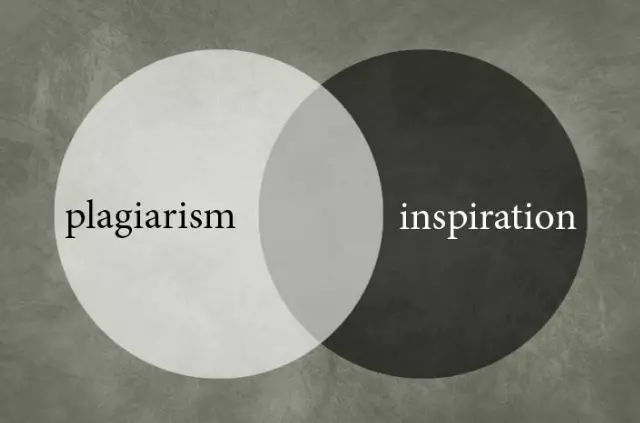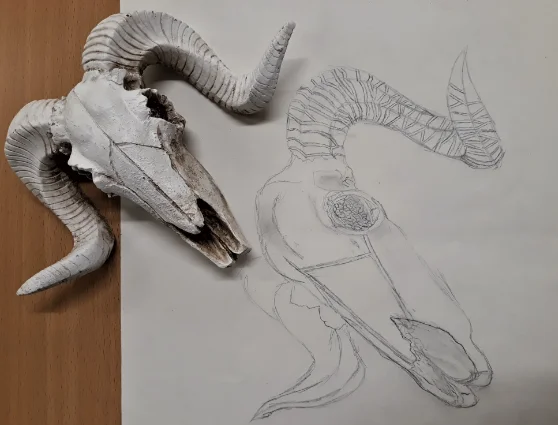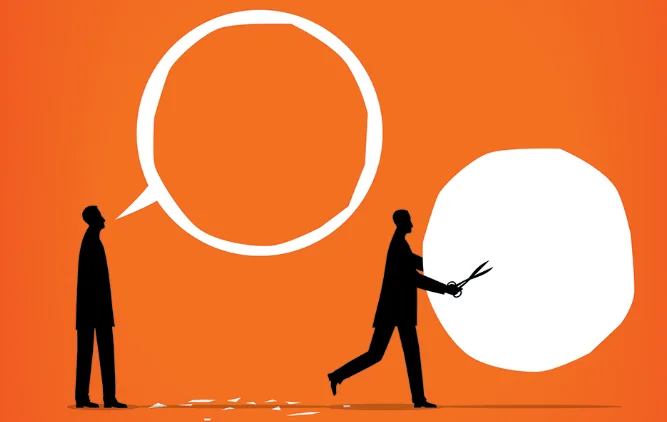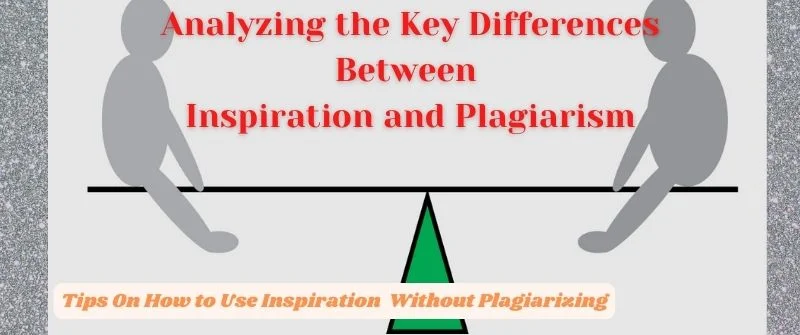There is a fine line between keeping things fresh and coming off as a copycat in writing. When that angle is too similar to another writer’s idea, it becomes plagiarism.
It is fine to get inspiration from other people’s ideas. However, if you’re going to achieve success with your writing, it is crucial that you have a unique spin on things that sets you apart from your competition. Read on.
Inspiration vs. Plagiarism
It is the use of another’s words, phrases, ideas, or expressions without crediting the source. It is a serious offense in academia and journalism, but it is also unethical in many professions, including business.
A key question in deciding whether plagiarism is real is when you fail to acknowledge the source.

One way to avoid plagiarism is to keep your notes and research organized.
That way, you can cite your sources when it is time to write your paper or report.
Inspiration, on the other hand, does not involve any sort of dishonest act, nor does it come with any kind of legal consequences attached to it.
Instead, we consider inspiration to be an idea or thought that gets you motivated to do something new and better than what you have been doing up until that point in time.
Better yet, inspiration gives you a feeling or thought about doing something better than what you have been doing before, prompting you to strive harder for it. This might seem like plagiarism on the surface, but there is more!
The Difference
The primary difference between inspiration and plagiarism comes down to attribution. One gets inspired by something by reading or hearing if you take that information and apply it to your own work.
Inspiration is getting an idea sparked by reading an author’s content, which informs your direction in writing and content. It is simply getting a clue of what to write about and sometimes what not to write about.
On the other hand, plagiarism copying content or ideas of other writers without giving them credit by properly referencing the sources.
That often means changing the phrasing or adding your own spin, so it is not exactly the same as what you read or heard. However, if you copy material word for word and don’t cite the source, that’s plagiarism.
When Getting Inspiration is not Plagiarism?
Caption this, you are a writer, and you want to write, but inspiration is not there. You are desperate to write something, but you do not know what to write. Besides, you are stuck in the middle of nowhere, and you feel like giving up. How can you get out of this situation?

In fact, inspiration is key to a successful writer. The inspiration will help you out of the dead-end, and your writing ideas will flow like a river.
You will write what you want in a short period of time.
Inspiration, no doubt, is a wonderful thing. It helps us to grow beyond our limits and do something greater than we could possibly achieve on our own.
Even better, when you get inspired by something, you can easily create something new.
Inspiration is one of the most powerful forms of learning. It is a process of consciously or unconsciously incorporating new information into your life experience, altering your worldview and ideas to create something unique.
Inspiration allows you to sync with the latest trends, ideas, and designs that are out there. It basically helps you to perfect the art of writing essays without plagiarizing from the sources you get points from.
In the academic world, inspiration involves copying only the essence of that work. It means you can use someone else’s writing as an inspiration for your own without using any of their actual content.
Contrary to what some might think, inspiration is not the same thing as copying. It is not about stealing someone else’s work or using someone else’s idea without giving credit. It’s about sparking your own creativity and taking it in your own direction.
How to get Inspiration without Copying
It is easy to get inspired by someone else’s work, but it’s not always easy to avoid becoming a copycat. To make sure you are getting the best parts of another’s work and leaving out the bad, follow these tips:

1. Think about what you are doing.
2. Even though you just want inspiration, think about how to do it better.
3. Don’t be afraid to ask for feedback from others on what you’ve done or are doing.
4. With every idea and every project, ask yourself if this is the best thing for your viewers/customers/clients and do what’s best for them.
Being inspired by others’ work is what makes us human. Some of the best ideas ever have been stolen and copied over time, but a lot of this happens subconsciously.
The truth is that creativity does not exist without inspiration. We can agree that there is nothing more motivating than getting an idea from another person.
What we do not generally agree on is how to go about getting that idea and still give credit to the original creator. Here are a couple of tips to help you avoid copying someone else’s work:
1. Know your Facts
Before you start even thinking about writing something, make sure you’re fully aware of all the facts.
If you’re writing about a particular incident or topic, read as many articles and other sources as possible so you can come up with your own unique angle.
2. Don’t be Afraid to Ask Questions
If there’s something you don’t completely understand, then it is okay to ask it to be clarified.
It’s essential to find out more information and show that you’ve done some research around the topic at hand.
3. Avoid Using Direct Quotes
Paraphrasing someone else’s work is never a good idea, but directly quoting them isn’t always necessary either, especially if your point is reasonably similar.
Is Inspiration from other Writers Considered Plagiarism?
Some writers find inspiration in everyday life, while others get inspiration from reading books or watching movies. Writing may be an individual effort, but it does not happen in isolation.
It is hard to admit it, but we all participate in a creative process that involves research and other people’s work.
Whether we consider those ideas are plagiarism or not, depends on the details of each case. And since plagiarism can result in severe penalties for both students and professionals alike, it’s essential to know what constitutes plagiarism and what doesn’t.
Getting inspiration from other writers or from someone’s work is not considered plagiarism if you do not copy it without credit. Also, if you take an idea that belongs to another person and turn it into something completely different, then this is not plagiarism.
However, it is plagiarism if you use copy content from another person.
For example, you want to write a story about a single mother who leaves her abusive husband and meets a man who opens her heart to new possibilities. You do not have to steal from anyone else. You can take those thoughts and turn them into your own story.
The act of getting inspiration does not give you permission to start using someone else’s work as your own. This is because it is plagiarism. Not unless you can learn how to copy without plagiarism by citing and paraphrasing.
Even though you might have found the idea somewhere else, it doesn’t mean that the person who had the idea before you permitted you to use their ideas.
Even though you did not copy anybody’s words or sentences, if they created something that you like, and if you use it in your own work without asking them or crediting them, this is a form of plagiarism.
If you are in doubt whether or not your work constitutes plagiarism, ask yourself these questions:
1) Have I credited the person whose work I used?
2) Do I want people to know where I got my inspiration from?
3) Do I want people to know what other sources I used for my project?
If the answers to these questions are no, then the chances are that you did something wrong and that what you have done constitutes plagiarism.

